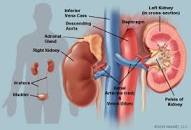
Recently Diagnosed or Relapsed? Stop Looking For a Miracle Cure, and Use Evidence-Based Therapies To Enhance Your Treatment and Prolong Your Remission
Multiple Myeloma an incurable disease, but I have spent the last 25 years in remission using a blend of conventional oncology and evidence-based nutrition, supplementation, and lifestyle therapies from peer-reviewed studies that your oncologist probably hasn't told you about.
Click the orange button to the right to learn more about what you can start doing today.
- You are here:
- Home »
- Blog »
- Multiple Myeloma »
- Cytoxan During Myeloma Therapy?
Cytoxan During Myeloma Therapy?

“In summary, we show that mobilization with Cytoxan increases toxicity without positively impacting long-term outcomes in MM. Our findings place into question Cy’s benefit as a routine component of stem cell mobilization regimens in MM.”
Cytoxan (cyclophosphamide) can be a therapy used to stimulate stem cell production before an autologous stem cell transplant for the multiple myeloma patient.
Toxic chemotherapy is a double-edged sword. My experience as a long-term multiple myeloma survivor is that there are times when MM patients patients must undergo toxic chemotherapy. Cytoxan can kill MM. There is no way of getting around this fact sometimes.
However, it is critical for cancer patients to understand the probable consequences of any given toxic therapy. I say this because many short, long-term and late-stage side effects caused by chemotherapy can be reduced or even avoided altogether.
According to research, approximately 40% of MM patients suffer from MM induced kidney damage.
Cisplatin causes a host of different types of collateral damage. The focus of this post is both the damage done to one’s kidneys as well as the cytoxan’s ability to deplete the body’s magnesium. Or to combine what we can learn from both studies linked below, cisplatin administration will deplete the body’s Mg. If a person’s levels of Mg are low enough, he/she will experience kidney damage.
I am a long-term MM survivor and MM cancer coach. I have remained in complete remission from my “incurable” cancer since ’99 by living an evidence-based, non-toxic, anti-cancer lifestyle.
I haven’t undergone chemotherapy since 1995. However, I live with chemotherapy-induced heart, nerve, brain, etc damage. Studies have shown that magnesium can help me with many of my long-term side effects.
Scroll down the page, post a question or a comment about your cancer, therapies, etc. and I will reply to you ASAP.
Thank you,
David Emerson
- MM Survivor
- MM Cancer Coach
- Director PeopleBeatingCancer
Recommended Reading:
- Biochemical Relapse in Multiple Myeloma- To Treat or Not To Treat?
- Autologous Stem Cell Transplant- NO OVERALL SURVIVAL for Myeloma
- Cannabidiol (CBD) as Multiple Myeloma therapy-
Cyclophosphamide-Based Hematopoietic Stem Cell Mobilization Before Autologous Stem Cell Transplantation in Newly Diagnosed Multiple Myeloma
“In summary, we show that mobilization with Cy increases toxicity without positively impacting long-term outcomes in MM. Our findings place into question Cy’s benefit as a routine component of stem cell mobilization regimens in MM. Randomized trials are needed to elucidate the risks and benefits of Cy more definitively…”
Magnesium
What is Mg and what does it do?
“Magnesium is a nutrient that the body needs to stay healthy. Mg is important for many processes in the body, including regulating muscle and nerve function, blood sugar levels, and blood pressure and making protein, bone, and DNA…”
Cisplatin
“Cisplatin is a chemotherapy medication used to treat a number of cancers.[1] This includes testicular cancer, ovarian cancer, cervical cancer, breast cancer, bladder cancer, head and neck cancer, esophageal cancer, lung cancer, mesothelioma, brain tumors and neuroblastoma.[1] It is used by injection into a vein…
Cisplatin has a number of side effects that can limit its use: Nephrotoxicity (kidney damage) is a major concern. The dose is reduced when the patient’s creatinine clearance (a measure of renal function) is reduced.
Magnesium depletion in patients receiving cisplatin-based chemotherapy.
“Aim– To assess the incidence of hypomagnesemia, the influence of different cisplatin dosages on the degree of hypomagnesemia and the effect of routine magnesium supplementation on magnesium levels…
Results-Baseline magnesium levels were available for 195 patients, 92% were within the normal range. The average level was 0.82 mmol/l. There was a statistically significant decrease in Mg levels from baseline to the lowest Mg level.
The incidence of hypomagnesemia at any point during chemotherapy was 43%. Multiple regression analysis showed a significant association between dose, frequency, and the number of cycles given, and the degree of hypomagnesemia.
Routine Mg supplementation significantly reduced the degree of hypomagnesemia if sufficient amounts of Mg are given: 60 mmol magnesium per cycle for a regimen containing 33 mg/m(2)/week cisplatin is sufficient; 20 mmol Mg per cycle for a regimen containing 40 mg/m(2)/week cisplatin is insufficient.
CONCLUSIONS- It is recommended that Mg levels should be measured routinely in all patients receiving cisplatin and that all cisplatin-based chemotherapy regimens should be supplemented routinely with sufficient doses of Mg (40-80 mmol Mg per cycle depending on the regimen).
Renal protection with Mg subcarbonate and Mg sulfate in patients with epithelial ovarian cancer after cisplatin and paclitaxel chemotherapy: a randomised phase II study.
“The aim of this study was to examine the effect of magnesium supplementation on nephrotoxicity accompanying standard cisplatin-based chemotherapy in patients with epithelial ovarian cancer (EOC)…
41 EOC patients were randomised and 40 were eligible. sMg varied significantly between the supplemented and placebo groups (p<0.0001). The control group showed a significantly greater decrease of GFR assessed by: sCr (p=0.0069), ClCG (p=0.0077) and MDRD (p=0.032) formulae compared with the magnesium-supplemented group.
CONCLUSIONS: These results demonstrate the nephroprotective effect of magnesium supplementation during chemotherapy with cisplatin…”


